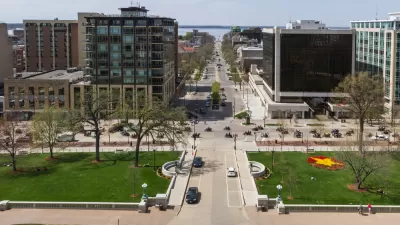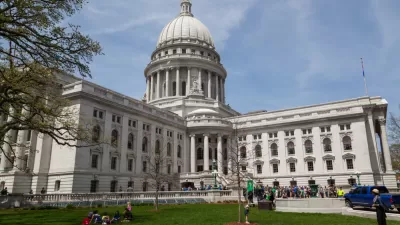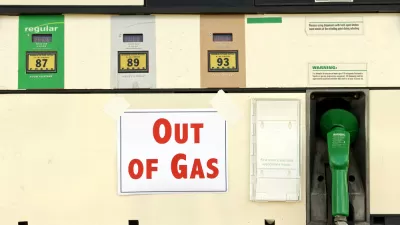WI Gov. Scott Walker's proposal is to sell-off state assets, primarily state power plants to finance his transportation plan, thus linking rate payers with funding road projects. His transportation commission recommended raising the gas tax and fees.
In yet another example of a governor resorting to extreme measures to avoid doing what the experts recommend - raising the state gas tax or other road user fees - Wisconsin Governor Scott Walker seeks "to sell the 37 power and heating plants" to finance his two-year $6.4 billion transportation plan. Patrick Marley, Jason Stein and Don Walker write that such a "move could also have the unexpected effect of linking the prices paid by some utility customers to the financing of the state's road system".
Presenting the broad outlines of his roads plan, Walker said he will not recommend raising the gas tax or vehicle registration fees - ideas advocated by a commission he and legislators set up two years ago.
By increasing user fees such as gas taxes, vehicle registration fees, and road tolls - a 'pay-as-you-go' approach to financing the plan would be possible. Walker is opting for a bonding approach - dependent upon selling state assets, according to what was told to Assembly Speaker Robin Vos (R-Rochester) by the Walker administration.
The power plants serve University of Wisconsin campuses and state prisons. A Republican state senator skeptical of the plan asked how the sale would affect the rates that the state pays for utilities and "ordinary ratepayers unconnected to the state".
The proposal is somewhat reminiscent of another state sale of a state asset: the 2006 leasing of the Indiana Toll Road to a private consortium. In that case, drivers on the toll road, rather than utility payers, would be tied to financing a 10-year state transportation plan.
The proposal needs legislators' approval - and ensuring a competitive process for selling the assets may secure it. Approval by the state Public Service Commission is not needed according the governor - but refuted by others as they are charged to determine if "if projects are 'in the public interest'".
In fact, such a sale could make sense as the facilities are aging, in need of upgrade, and may need to be converted to burning natural gas or biomass from coal, according to the JS reporters. Whether revenues be dedicated to road projects that have a dedicated steady, if declining revenue stream is another matter.
Unlike most other states, the state gas tax had been indexed to inflation according to the Wisconsin Dept. of Transportation (PDF) - but "(t)he Legislature froze the state gas tax at 32.9 cents per gallon in 2006". According to the Tax Foundation map, it is the fourteenth highest in the nation.
The 'path not taken' by Gov. Walker is one just taken by fellow Republican Gov. Matt Mead of Wyoming on Feb. 15 when he signed a substantial state gas tax increase bill of 10-cents or 71%. AP via the Casper Star-Tribune Online wrote that the governor "says the state can no longer afford to subsidize the transportation department from general funds." The entire hike goes into effect on July 1, resulting in a total state excise tax of 24 cents.
FULL STORY: Scott Walker's transportation budget might include sale of state power plants

Planetizen Federal Action Tracker
A weekly monitor of how Trump’s orders and actions are impacting planners and planning in America.

Maui's Vacation Rental Debate Turns Ugly
Verbal attacks, misinformation campaigns and fistfights plague a high-stakes debate to convert thousands of vacation rentals into long-term housing.

San Francisco Suspends Traffic Calming Amidst Record Deaths
Citing “a challenging fiscal landscape,” the city will cease the program on the heels of 42 traffic deaths, including 24 pedestrians.

Amtrak Rolls Out New Orleans to Alabama “Mardi Gras” Train
The new service will operate morning and evening departures between Mobile and New Orleans.

The Subversive Car-Free Guide to Trump's Great American Road Trip
Car-free ways to access Chicagoland’s best tourist attractions.

San Antonio and Austin are Fusing Into one Massive Megaregion
The region spanning the two central Texas cities is growing fast, posing challenges for local infrastructure and water supplies.
Urban Design for Planners 1: Software Tools
This six-course series explores essential urban design concepts using open source software and equips planners with the tools they need to participate fully in the urban design process.
Planning for Universal Design
Learn the tools for implementing Universal Design in planning regulations.
Heyer Gruel & Associates PA
JM Goldson LLC
Custer County Colorado
City of Camden Redevelopment Agency
City of Astoria
Transportation Research & Education Center (TREC) at Portland State University
Jefferson Parish Government
Camden Redevelopment Agency
City of Claremont





























